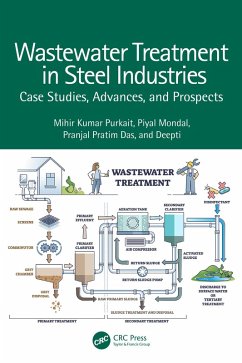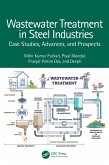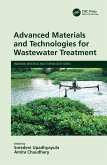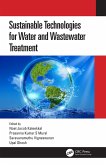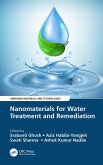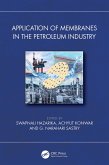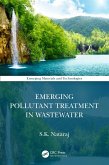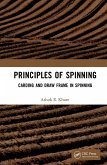Mihir Kumar Purkait, Piyal Mondal, Pranjal Pratim Das, Deepti
Wastewater Treatment in Steel Industries (eBook, ePUB)
Case Studies, Advances, and Prospects
51,95 €
51,95 €
inkl. MwSt.
Sofort per Download lieferbar

26 °P sammeln
51,95 €
Als Download kaufen

51,95 €
inkl. MwSt.
Sofort per Download lieferbar

26 °P sammeln
Jetzt verschenken
Alle Infos zum eBook verschenken
51,95 €
inkl. MwSt.
Sofort per Download lieferbar
Alle Infos zum eBook verschenken

26 °P sammeln
Mihir Kumar Purkait, Piyal Mondal, Pranjal Pratim Das, Deepti
Wastewater Treatment in Steel Industries (eBook, ePUB)
Case Studies, Advances, and Prospects
- Format: ePub
- Merkliste
- Auf die Merkliste
- Bewerten Bewerten
- Teilen
- Produkt teilen
- Produkterinnerung
- Produkterinnerung

Bitte loggen Sie sich zunächst in Ihr Kundenkonto ein oder registrieren Sie sich bei
bücher.de, um das eBook-Abo tolino select nutzen zu können.
Hier können Sie sich einloggen
Hier können Sie sich einloggen
Sie sind bereits eingeloggt. Klicken Sie auf 2. tolino select Abo, um fortzufahren.

Bitte loggen Sie sich zunächst in Ihr Kundenkonto ein oder registrieren Sie sich bei bücher.de, um das eBook-Abo tolino select nutzen zu können.
Treatment of toxic wastewater generated from different unit operations of steel industry is matter of extensive research. This book covers case studies of various treatment techniques utilized for the remediation of different steel industry unit operation wastewater.
- Geräte: eReader
- mit Kopierschutz
- eBook Hilfe
Andere Kunden interessierten sich auch für
![Wastewater Treatment in Steel Industries (eBook, PDF) Wastewater Treatment in Steel Industries (eBook, PDF)]() Mihir Kumar PurkaitWastewater Treatment in Steel Industries (eBook, PDF)51,95 €
Mihir Kumar PurkaitWastewater Treatment in Steel Industries (eBook, PDF)51,95 €![Advanced Materials and Technologies for Wastewater Treatment (eBook, ePUB) Advanced Materials and Technologies for Wastewater Treatment (eBook, ePUB)]() Advanced Materials and Technologies for Wastewater Treatment (eBook, ePUB)51,95 €
Advanced Materials and Technologies for Wastewater Treatment (eBook, ePUB)51,95 €![Sustainable Technologies for Water and Wastewater Treatment (eBook, ePUB) Sustainable Technologies for Water and Wastewater Treatment (eBook, ePUB)]() Sustainable Technologies for Water and Wastewater Treatment (eBook, ePUB)69,95 €
Sustainable Technologies for Water and Wastewater Treatment (eBook, ePUB)69,95 €![Nanomaterials for Water Treatment and Remediation (eBook, ePUB) Nanomaterials for Water Treatment and Remediation (eBook, ePUB)]() Nanomaterials for Water Treatment and Remediation (eBook, ePUB)53,95 €
Nanomaterials for Water Treatment and Remediation (eBook, ePUB)53,95 €![Application of Membranes in the Petroleum Industry (eBook, ePUB) Application of Membranes in the Petroleum Industry (eBook, ePUB)]() Application of Membranes in the Petroleum Industry (eBook, ePUB)51,95 €
Application of Membranes in the Petroleum Industry (eBook, ePUB)51,95 €![Emerging Pollutant Treatment in Wastewater (eBook, ePUB) Emerging Pollutant Treatment in Wastewater (eBook, ePUB)]() S. K. NatarajEmerging Pollutant Treatment in Wastewater (eBook, ePUB)47,95 €
S. K. NatarajEmerging Pollutant Treatment in Wastewater (eBook, ePUB)47,95 €![Principles of Spinning (eBook, ePUB) Principles of Spinning (eBook, ePUB)]() Ashok R KharePrinciples of Spinning (eBook, ePUB)49,95 €
Ashok R KharePrinciples of Spinning (eBook, ePUB)49,95 €-
-
-
Treatment of toxic wastewater generated from different unit operations of steel industry is matter of extensive research. This book covers case studies of various treatment techniques utilized for the remediation of different steel industry unit operation wastewater.
Dieser Download kann aus rechtlichen Gründen nur mit Rechnungsadresse in A, B, BG, CY, CZ, D, DK, EW, E, FIN, F, GR, HR, H, IRL, I, LT, L, LR, M, NL, PL, P, R, S, SLO, SK ausgeliefert werden.
Produktdetails
- Produktdetails
- Verlag: Taylor & Francis eBooks
- Seitenzahl: 138
- Erscheinungstermin: 5. Dezember 2023
- Englisch
- ISBN-13: 9781003817086
- Artikelnr.: 69237620
- Verlag: Taylor & Francis eBooks
- Seitenzahl: 138
- Erscheinungstermin: 5. Dezember 2023
- Englisch
- ISBN-13: 9781003817086
- Artikelnr.: 69237620
- Herstellerkennzeichnung Die Herstellerinformationen sind derzeit nicht verfügbar.
Mihir Kumar Purkait is a Professor in the Department of Chemical Engineering and Head Centre for the Environment at Indian Institute of Technology Guwahati (IITG). Prior to joining as faculty in IITG (2004), he has received his PhD and M. Tech in Chemical Engineering from Indian Institute of Technology, Kharagpur (IITKGP) after completing his B. Tech and B. Sc (Hons) in Chemistry from University of Calcutta. He has received several awards. He is the director of 2 incubated companies. He is also technical advisor of Gammon India Ltd and Indian Oil Corporation, Bethkuchi for their treatment plant. His current research activities are focused in four distinct areas viz. i) advanced separation technologies, ii) waste to energy, iii) smart materials for various applications and iv) process intensification. In each of the area, his goal is to synthesis stimuli responsive materials and to develop a more fundamental understanding of the factors governing the performance of the chemical and biochemical processes.
Piyal Mondal received his B-Tech in Chemical Engineering from the National Institute of Technology Durgapur, West Bengal (INDIA) during 2012. He completed his Masters Degree and Ph.D. degree in Chemical Engineering from the Indian Institute of Technology Guwahati (INDIA). His research work is dedicated to preparing various surface engineered nanomaterials and polymers for specific environmental applications. Synthesis of polymeric membranes, green synthesized nano-materials, and hybrid techniques to combat wastewater treatment is also his research focus. He has fabricated different prototypes for environmental separation applications.
Pranjal Pratim Das received his B. Tech (2014) and M. Tech (2017) degree in Food Engineering and Technology from Tezpur (Central) University, Assam, India. He is currently pursuing his Ph.D. degree in Chemical Engineering from the Indian Institute of Technology Guwahati, Assam, India. His research work is purely dedicated to industrial wastewater treatment, utilizing advanced oxidation treatment techniques. Also, application of integrated (electrochemical and oxidation) water treatment processes for the remediation of specific unit operations of steel industry wastewater is his research focus. He is also working in remediation application of wastewater collected from Tata Steel Industry, Jamshedpur India.
Deepti is currently pursuing her PhD in Centre for the Environment from Indian Institute of Technology, Guwahati (IITG). She received her Master's Degree (2016) in Industrial pollution control from Manipal Institute of Technology, Manipal, Karnataka and BTech (2014) from Alvas Institute of Engineering and Technology, Moodbidri, Karnataka. Her current research activities are focused in advanced separation technologies, conversion of industrial waste to valuable resources, wastewater treatment and industrial effluent treatment technologies. She has been closely working with steel plant wastewater from Tata Steel, and has published several peer reviewed articles on this.
Piyal Mondal received his B-Tech in Chemical Engineering from the National Institute of Technology Durgapur, West Bengal (INDIA) during 2012. He completed his Masters Degree and Ph.D. degree in Chemical Engineering from the Indian Institute of Technology Guwahati (INDIA). His research work is dedicated to preparing various surface engineered nanomaterials and polymers for specific environmental applications. Synthesis of polymeric membranes, green synthesized nano-materials, and hybrid techniques to combat wastewater treatment is also his research focus. He has fabricated different prototypes for environmental separation applications.
Pranjal Pratim Das received his B. Tech (2014) and M. Tech (2017) degree in Food Engineering and Technology from Tezpur (Central) University, Assam, India. He is currently pursuing his Ph.D. degree in Chemical Engineering from the Indian Institute of Technology Guwahati, Assam, India. His research work is purely dedicated to industrial wastewater treatment, utilizing advanced oxidation treatment techniques. Also, application of integrated (electrochemical and oxidation) water treatment processes for the remediation of specific unit operations of steel industry wastewater is his research focus. He is also working in remediation application of wastewater collected from Tata Steel Industry, Jamshedpur India.
Deepti is currently pursuing her PhD in Centre for the Environment from Indian Institute of Technology, Guwahati (IITG). She received her Master's Degree (2016) in Industrial pollution control from Manipal Institute of Technology, Manipal, Karnataka and BTech (2014) from Alvas Institute of Engineering and Technology, Moodbidri, Karnataka. Her current research activities are focused in advanced separation technologies, conversion of industrial waste to valuable resources, wastewater treatment and industrial effluent treatment technologies. She has been closely working with steel plant wastewater from Tata Steel, and has published several peer reviewed articles on this.
1- Introduction to steel industry
2- Classification, sources, and composition of steel industry wastewater
3- Environmental impacts of wastewater generated in steel industry
4- Treatment techniques for steel industry wastewater
5- Treatment of iron making wastewater
6- Treatment of biological oxidation treated wastewater: Case study
7- Treatment of steelmaking wastewater: Case study
8- Treatment of cold rolling wastewater: Case study
9- Sustainable management, techno-economic analysis, and Future perspectives
2- Classification, sources, and composition of steel industry wastewater
3- Environmental impacts of wastewater generated in steel industry
4- Treatment techniques for steel industry wastewater
5- Treatment of iron making wastewater
6- Treatment of biological oxidation treated wastewater: Case study
7- Treatment of steelmaking wastewater: Case study
8- Treatment of cold rolling wastewater: Case study
9- Sustainable management, techno-economic analysis, and Future perspectives
1- Introduction to steel industry
2- Classification, sources, and composition of steel industry wastewater
3- Environmental impacts of wastewater generated in steel industry
4- Treatment techniques for steel industry wastewater
5- Treatment of iron making wastewater
6- Treatment of biological oxidation treated wastewater: Case study
7- Treatment of steelmaking wastewater: Case study
8- Treatment of cold rolling wastewater: Case study
9- Sustainable management, techno-economic analysis, and Future perspectives
2- Classification, sources, and composition of steel industry wastewater
3- Environmental impacts of wastewater generated in steel industry
4- Treatment techniques for steel industry wastewater
5- Treatment of iron making wastewater
6- Treatment of biological oxidation treated wastewater: Case study
7- Treatment of steelmaking wastewater: Case study
8- Treatment of cold rolling wastewater: Case study
9- Sustainable management, techno-economic analysis, and Future perspectives
